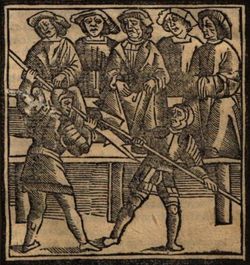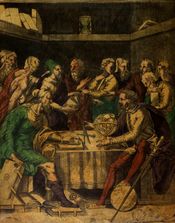|
|
You are not currently logged in. Are you accessing the unsecure (http) portal? Click here to switch to the secure portal. |
|
|
Do you have permission to re-use this image? Just because scans appear on Wiktenauer does not mean that they are free to use. Wiktenauer is a 501(c)(3) nonprofit, and many of the scans we host are only licensed for nonprofit use. In other cases, the scans have no standard license and Wiktenauer has received special permission to host them (and can't grant that permission to anyone else). The license terms appear in the Copyright and License Terms box at the bottom of the page that sent you here. When in doubt, always check with the museum or library that owns a manuscript before publishing or otherwise reusing its scans. |
Difference between revisions of "Paride del Pozzo"
(Created page with "https://it.wikipedia.org/wiki/Paride_Del_Pozzo category:not Started") |
|||
| Line 1: | Line 1: | ||
| − | + | {{Infobox writer | |
| + | | name = [[name::Paride del Pozzo]] | ||
| + | | image = File:Pozzo title image.png | ||
| + | | imagesize = 250px | ||
| + | | caption = | ||
| − | [[ | + | | pseudonym = Paridis de Puteo<br/>Paris de Puteo |
| + | | birthname = | ||
| + | | birthdate = 1410 | ||
| + | | birthplace = Pimonte | ||
| + | | deathdate = 1493 | ||
| + | | deathplace = Napoli | ||
| + | | resting_place = Chiesa d'Sant Agostino | ||
| + | | occupation = [[occupation::Jurist]] | ||
| + | | language = {{plainlist | ||
| + | | [[language::Italian]] | ||
| + | | [[language::Renaissance Latin]] | ||
| + | }} | ||
| + | | nationality = | ||
| + | | ethnicity = | ||
| + | | citizenship = Neapolitan | ||
| + | | education = | ||
| + | | alma_mater = University of Naples | ||
| + | | patron = Alfonso V of Aragon | ||
| + | |||
| + | | period = | ||
| + | | genre = Legal treatise | ||
| + | | subject = | ||
| + | | movement = | ||
| + | | notableworks = ''[[De duello, vel De re militari in singulari certamine (Paride del Pozzo)|De duello]]'' (1476) | ||
| + | | manuscript(s) = | ||
| + | | principal manuscript(s)= | ||
| + | | first printed edition= 1476 | ||
| + | | wiktenauer compilation by= | ||
| + | |||
| + | | spouse = | ||
| + | | partner = | ||
| + | | children = | ||
| + | | relatives = | ||
| + | | influences = | ||
| + | | influenced = [[Achilles Marozzo]] | ||
| + | | awards = | ||
| + | | signature = | ||
| + | | website = | ||
| + | | translations = | ||
| + | | below = | ||
| + | }} | ||
| + | '''Paride del Pozzo''' (called '''il Puteo'''; Latin: ''Paridis'' or ''Paris de Puteo'') (1410-1493) was [[century::15th century]] Italian jurist. He was born in Pimonte in the Duchy of Amalfi, from a family of Piedmontese origin.<ref>According to Pietro Giannone, the family was originally from Alexandria, forced to continue moving due to political struggles.</ref> He moved to Napoli early in life, where he began his study of the law; he went on to study at universities in Rome, Bologna, Florence, and Perugia. Upon his return to Napoli, he entered the service of Alfonso V of Aragon ("the Magnanimous"), king of Napoli, and served in positions including General Auditor and General Inquisitor. | ||
| + | |||
| + | He later in his career, Pozzo wrote and published various legal treatises; perhaps owing to their position at the very beginning of the history of printing, they were republished many times over the subsequent century. His treatise ''De duello, vel De re militari in singulari certamine'' ("On the Duel, or On Military Matters in Single Combat") is particularly important due to its detailed descriptions of dueling laws and customs, which help establish the context of 15th century fighting systems, and also of incidents from specific historical duels, which shed light on how fighting looked in practice. | ||
| + | |||
| + | Pozzo died in 1493 and was buried in the Chiesa d'Sant Agostino in Napoli. | ||
| + | |||
| + | == Treatise == | ||
| + | |||
| + | {{master begin | ||
| + | | title = ''De Duello'' | ||
| + | | width = 150em | ||
| + | }} | ||
| + | {| class="floated master" | ||
| + | |- | ||
| + | ! <p>{{rating}}</p> | ||
| + | ! <p>[[De duello, vel De re militari in singulari certamine (Paride del Pozzo)|First Edition]] (1476){{edit index|De duello, vel De re militari in singulari certamine (Paride del Pozzo) 1476.pdf}}</p> | ||
| + | ! <p>Italian Translation (1518)<br/>by [[Michael Chidester]]</p> | ||
| + | ! <p>Spanish Translation (1544)<br/>by [[Michael Chidester]]</p> | ||
| + | ! <p>English Translation (1580)<br/>by [[David Kite]]</p> | ||
| + | |||
| + | |- | ||
| + | | | ||
| + | | | ||
| + | | | ||
| + | | | ||
| + | | | ||
| + | |||
| + | |} | ||
| + | {{master end}} | ||
| + | |||
| + | == Additional Resources == | ||
| + | |||
| + | |||
| + | |||
| + | == References == | ||
| + | |||
| + | {{reflist}} | ||
| + | {{DEFAULTSORT:Liberi, Fiore de’i}} | ||
| + | {{early Italian masters}} | ||
| + | __FORCETOC__ | ||
| + | |||
| + | [[Category:Masters]] | ||
| + | |||
| + | [[Category:English]] | ||
| + | [[Category:Italian]] | ||
| + | [[Category:Latin]] | ||
| + | [[Category:Spanish]] | ||
| + | |||
| + | [[Category:Armored Fencing]] | ||
| + | [[Category:Dagger]] | ||
| + | [[Category:Grappling]] | ||
| + | [[Category:Longsword]] | ||
| + | [[Category:Mounted Fencing]] | ||
| + | [[Category:Pole Weapons]] | ||
| + | [[Category:Staff Weapons]] | ||
Revision as of 19:13, 11 June 2018
| Paride del Pozzo | |
|---|---|
 | |
| Born | 1410 Pimonte |
| Died | 1493 Napoli |
| Resting place | Chiesa d'Sant Agostino |
| Pseudonym | Paridis de Puteo Paris de Puteo |
| Occupation | Jurist |
| Citizenship | Neapolitan |
| Alma mater | University of Naples |
| Patron | Alfonso V of Aragon |
| Influenced | Achilles Marozzo |
| Genres | Legal treatise |
| Language | |
| Notable work(s) | De duello (1476) |
| First printed english edition |
1476 |
Paride del Pozzo (called il Puteo; Latin: Paridis or Paris de Puteo) (1410-1493) was 15th century Italian jurist. He was born in Pimonte in the Duchy of Amalfi, from a family of Piedmontese origin.[1] He moved to Napoli early in life, where he began his study of the law; he went on to study at universities in Rome, Bologna, Florence, and Perugia. Upon his return to Napoli, he entered the service of Alfonso V of Aragon ("the Magnanimous"), king of Napoli, and served in positions including General Auditor and General Inquisitor.
He later in his career, Pozzo wrote and published various legal treatises; perhaps owing to their position at the very beginning of the history of printing, they were republished many times over the subsequent century. His treatise De duello, vel De re militari in singulari certamine ("On the Duel, or On Military Matters in Single Combat") is particularly important due to its detailed descriptions of dueling laws and customs, which help establish the context of 15th century fighting systems, and also of incidents from specific historical duels, which shed light on how fighting looked in practice.
Pozzo died in 1493 and was buried in the Chiesa d'Sant Agostino in Napoli.
Treatise
First Edition (1476) |
Italian Translation (1518) |
Spanish Translation (1544) |
English Translation (1580) | |
|---|---|---|---|---|
Additional Resources
References
- ↑ According to Pietro Giannone, the family was originally from Alexandria, forced to continue moving due to political struggles.

